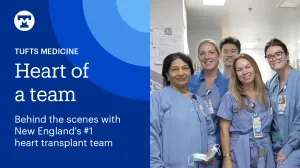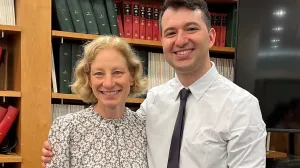
On June 3, 2022, Kayla Messana’s husband woke up to the sound of her desperately gasping for air and immediately knew something was wrong. He called 911, dragged her to the floor and performed CPR for 10 minutes until paramedics arrived.
For the next 24 hours, Kayla repeatedly went into cardiac arrest, requiring her heart to be shocked back into rhythm 8 or 9 times. Her condition was so severe that Kayla was transported from her local hospital in New Hampshire to Tufts Medical Center.
“As soon as I got there, they did everything under the sun to save my life,” she said.
She was put into a medically induced coma for 4 days so her heart could rest. The situation was so dire that her husband, unsure if she’d survive, brought their 3 children, who were 2, 7 and 12 years old at the time, to see Messana in the hospital.
At 31 years old, Messana had no previous health history or symptoms.
Doctors determined that she went into sudden cardiac arrest, which is when someone dies unexpectedly within an hour of the start of symptoms or within 24 hours of symptom onset. It’s caused by a heart arrhythmia or an abnormal heartbeat that can cause the heart to beat too fast, slow or irregularly.
In Messana’s case, there was no clear cause of the sudden cardiac arrest. She underwent implantation of an implantable cardioverter defibrillator, or ICD, to prevent another cardiac arrest and monitor her cardiac rhythm. An ICD is a device implanted under the skin and connected to the heart that delivers an electrical shock when the heart goes into a life-threatening arrhythmia.
Kayla returned home and then in January 2024, she had another episode. She woke up and felt “this crazy pressure in my chest,” and her arms were numb. Her ICD had shocked her heart back into a normal rhythm. She called her doctors the next day.
“I was in denial,” she said. “I was thinking that this can’t happen to me again, this is insane.”
This time, Munther Homoud, MD, Co-Director, Cardiac Arrhythmia and Indranee Rajapreyar, MD, Medical Director, Cardiac Transplantation, compared the data from the ICD to past data to determine that Kayla has a rare, life-threatening heart rhythm disorder called polymorphic ventricular tachycardia (PVT). PVT causes the heart to beat rapidly and irregularly, which can cause sudden cardiac arrest.
Dr. Homoud and his team noticed a rare and unusual pattern of extra heartbeats coming from one of the lower chambers of Kayla’s heart. These irregular beats were triggering a dangerous type of fast heart rhythm. They found a description of this condition in medical research and reached out to the author, who confirmed their suspicion. The team then created a treatment plan using medication. In February 2024, Kayla was admitted to the hospital to see how her body would respond to the new meds. She now takes 8 pills a day and hasn’t had any more episodes of the life-threatening heart rhythm since starting the treatment.
It’s been an adjustment, but Messana said the Tufts Medical Center team has been incredibly supportive.
“Everyone is so great at Tufts Medicine,” she said. “I shoot them a message and they respond the same day.”
Although Messana has a solid treatment plan, her life is different. She struggles with heart palpitations, exhaustion, dizziness and other PVT symptoms. She’s had to cut back on work to part-time and tries to exercise when possible.
She wants other people her age to know that cardiac arrest and sudden death can happen to people in their 30s.
I was totally normal, but it was crazy for me. I had no idea what cardiac arrest was even for my age. To this day, I haven’t met many people my age who have gone through such trauma and medical problems at such a young age.
Kayla Messana, patient
Every 6 months, Messana visits Tufts Medical Center to see Drs. Homoud and Rajapreyar. She said the care she has received has been “life-changing.”
“I tell them exactly how I feel, and they genuinely listen and genuinely care,” she said. “That makes me feel better about my situation and taking all of my medications. They get it. They make me feel validated.”

